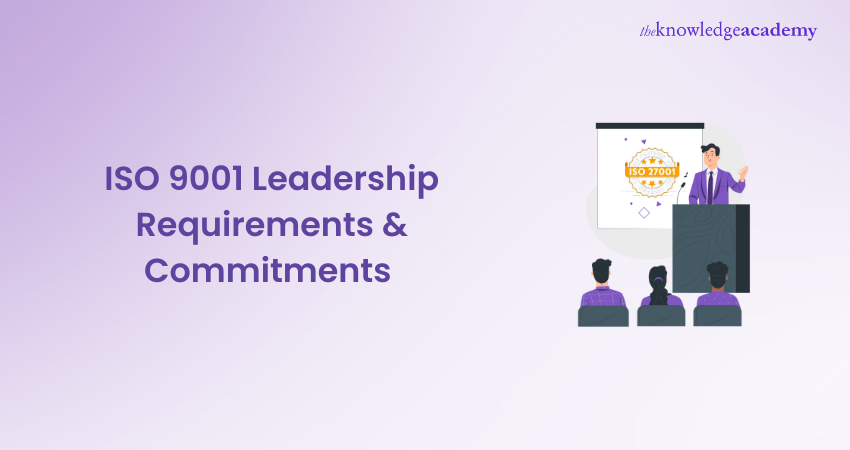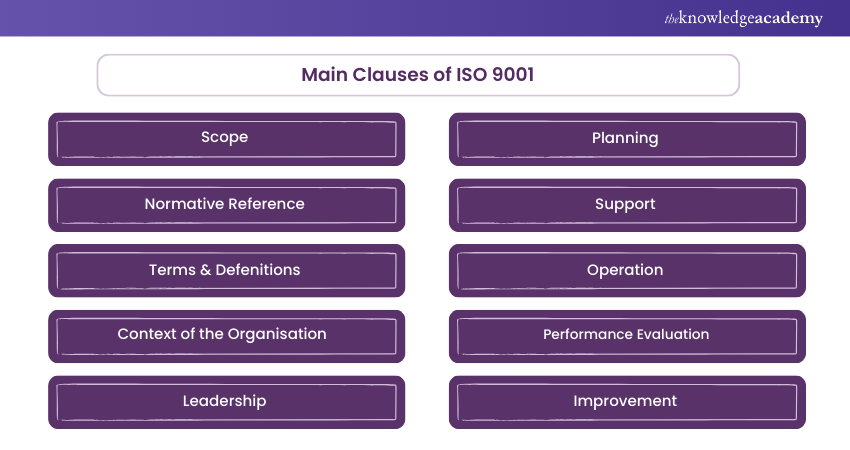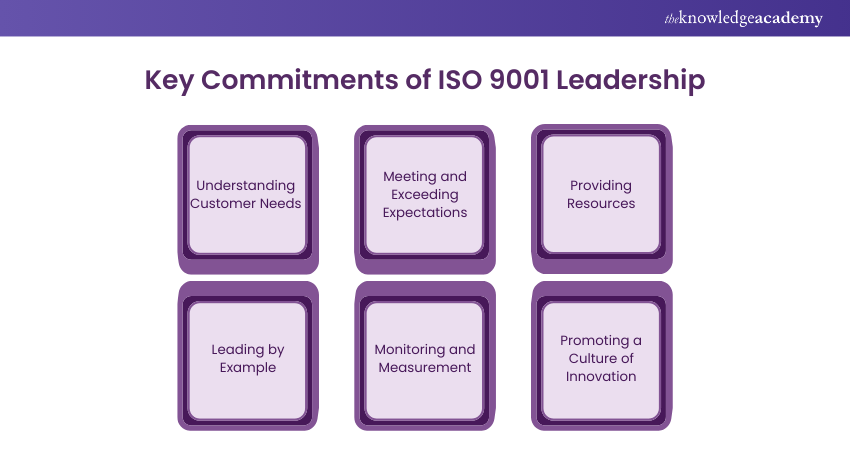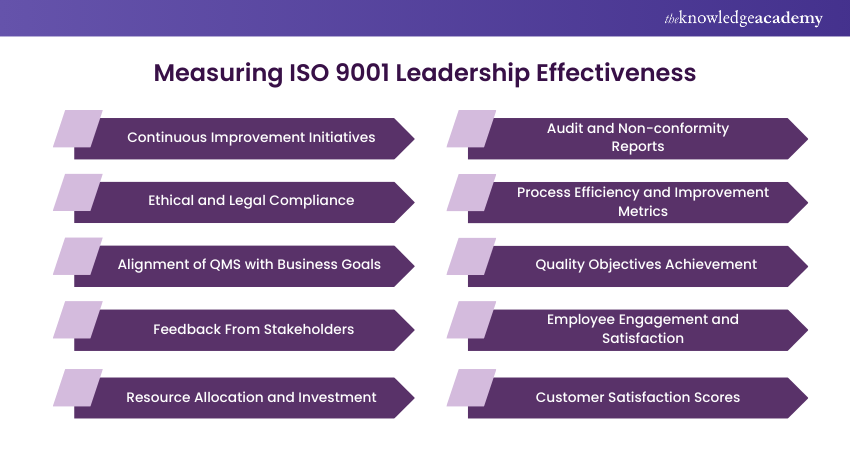We may not have the course you’re looking for. If you enquire or give us a call on +44 1344 203 999 and speak to our training experts, we may still be able to help with your training requirements.
We ensure quality, budget-alignment, and timely delivery by our expert instructors.

Every organisation strives for quality, and its efforts help it not only comply with high organisational standards but also stand out in the corporate landscape. This is where the ISO 9001 standard comes into play as a gold standard in Quality Management by outlining essential requirements for a strong Quality Management System (QMS). Central to its success are the ISO 9001 Leadership Requirements that drive organisational excellence.
This standard emphasises the role of top management in developing a quality-centric culture, driving customer satisfaction, and guiding continuous improvement. This blog dives into ISO 9001 Leadership Requirements and highlights how to measure leadership effectiveness. Read on!
Table of Contents
1) Defining ISO 9001:2015
2) Leadership Requirements in ISO 9001:2015
3) Key Commitments of ISO 9001:2015 Leadership
4) Measuring Leadership Effectiveness
5) Conclusion
Defining ISO 9001
ISO 9001 is a comprehensive and internationally recognised standard that serves as a framework for establishing and managing a Quality Management System (QMS) within an organisation . This standard is developed by the International Organisation for Standardisation (ISO), including ISO 9001 and ISO 22000.

It outlines the requirements and guidelines for creating a systematic approach to Quality Management rooted in ISO 9001 Principles.Designedwith the aid of the ISO 9001 Audit checklist, it helps organisations of all sizes and industries enhance their product and service quality while achieving greater efficiency and customer satisfaction.
Leadership Requirements in ISO 9001:2015
ISO 9001:2015 Leadership places significant emphasis on driving the success of a QMS. Demonstrating Leadership involves:
a) Setting the Tone: Leaders must establish a quality-oriented culture by communicating the importance of quality, ethical behaviour, and compliance with the QMS.
b) Allocation of Resources: Leaders ensure that adequate resources, including human, financial, and infrastructural, are allocated to support the QMS effectively.
c) Leading by Example: Leading by example, Leaders showcase their commitment to quality through their actions and decisions. This allows employees at all levels to follow suit.
d) Regular communication: Effective communication channels should be established to disseminate information about the QMS and its performance, fostering transparency and engagement.
Key Commitments of ISO 9001:2015 Leadership
Leadership within an organisation plays a pivotal role in making sure the successful implementation and sustainability of a Quality Management System (QMS) as per ISO 9001:2015. The standard outlines several key Commitments that Leaders must adhere to foster a culture of quality and continuous improvement. The following comprise the Commitments of ISO 9001:2015 Leadership:

a) Understanding Customer Needs: Leaders must actively engage with customers to know their specific needs and expectations. This may involve surveys, feedback mechanisms, or direct communication.
b) Meeting and Exceeding Expectations: Leaders should ensure that the organisation's products or services consistently meet or surpass customer expectations. This commitment involves setting and reviewing quality objectives and regularly monitoring customer satisfaction levels.
c) Providing Resources: Allocating the necessary resources, including personnel, technology, and financial support, to establish and maintain an effective QMS.
d) Leading by Example: Demonstrating a strong commitment to the QMS by actively participating in its processes, following established procedures, and encouraging others to do the same.
e) Supporting Continuous Improvement: Encouraging a culture of ongoing improvement by fostering innovation and a willingness to adapt to changing circumstances or ISO 9001 Requirements.
f) Communication and engagement: Leaders should create channels for open communication, listen to employees' suggestions and concerns, and actively involve them in quality-related activities.
g) Providing Training and Development: Ensuring that employees have the necessary training and resources to fulfil their roles effectively, including training on quality-related processes and procedures.
h) Empowerment: Leaders should empower employees to take ownership of quality within their areas of responsibility, fostering a sense of ownership and accountability.
i) Setting Improvement Objectives: Identifying opportunities for improvement and establishing specific objectives to address these areas.
j) Monitoring and Measurement: Regularly evaluating the effectiveness of the QMS and processes through Key Performance Indicators (KPIs) and feedback mechanisms, in line with the ISO 9001 2015 Monitoring and Measurement Procedure.
k) Corrective and Preventive Action: Taking corrective action when non-conformities or deviations occur and implementing preventive actions to avoid recurrence.
l) Promoting a Culture of Innovation: Encouraging innovation and creative problem-solving to drive improvement throughout the organisation.
Join the ISO 9001 Foundation Training and pave your way to quality leadership!
Measuring Leadership Effectiveness
Measuring effectiveness in the context of ISO 9001:2015 Leadership is crucial for ensuring that top management fulfils its responsibilities in driving a successful Quality Management System (QMS). Here’s how you can assess the Leadership’s effectiveness in an organisation:

a) Customer Satisfaction Scores: Monitoring customer satisfaction scores through surveys and feedback mechanisms helps gauge Leadership's ability to make sure that customer needs and expectations are met. High scores indicate effective Leadership in delivering quality products or services. This aligns with the ISO 9001 Principles, which emphasize the importance of meeting customer requirements and enhancing satisfaction.
b) Employee Engagement and Satisfaction: Employee surveys, turnover rates, and feedback provide insights into how well Leaders engage and satisfy their workforce. Employees who are actively involved and content in their roles tend to make more constructive contributions to the Quality Management System (QMS).
c) Quality Objectives Achievement: Tracking the percentage of quality objectives achieved demonstrates Leadership's effectiveness in aligning these objectives with the organisation's goals. High achievement rates reflect strong Leadership commitment to quality.
d) Process Efficiency and Improvement Metrics: Monitoring performance data related to processes and process improvement initiatives reveals how effectively Leaders encourage process efficiency and continuous improvement. Improved process performance metrics show Leadership impact.
e) Audit and Non-conformity Reports: The number of non-conformities and corrective actions can indicate how efficiently Leaders address issues. Effective Leaders ensure that non-conformities are promptly resolved, showcasing their commitment to the QMS's effectiveness. Regular ISO 9001 Audits can provide valuable insights into these non-conformities and the effectiveness of the corrective actions taken.
f) Resource Allocation and Investment: Evaluating the investment in QMS-related resources (financial, human, technological) demonstrates Leadership's commitment to providing the necessary support for the QMS's success. Adequate resource allocation is a sign of effective Leadership.
g) Feedback from Stakeholders: Gathering feedback from stakeholders, including suppliers and partners, provides insights into Leadership's ability to manage and maintain mutually beneficial relationships. Positive stakeholder feedback reflects effective Leadership in relationship management.
h) Alignment of QMS with Business Goals: Assessing how well the QMS aligns with the organisation's broader business goals and strategies measures Leadership's effectiveness in ensuring that quality contributes to overall success.
i) Ethical and Legal Compliance: Ensuring that the organisation complies with ethical standards and legal regulations is a responsibility of Leadership. Evaluating the organisation's adherence to these ISO Quality Standards can indicate the Leadership's effectiveness in this regard
j) Continuous Improvement Initiatives: Examining the extent to which Leaders actively promote and engage in continuous improvement initiatives within the organisation measures their commitment to ongoing enhancement. Effective Leadership encourages a culture of innovation and problem-solving.
Looking to leverage auditing techniques to bolster your organisation’s quality management? Sign up for our ISO 9001 Internal Auditor Course now!
Conclusion
In summary, ISO 9001 Leadership Requirements are fundamental for building a quality-focused organisational culture. By prioritising these commitments, leaders can drive continuous improvement and achieve long-term success. We hope this blog catalyses your leadership skills and efforts towards organisational excellence.
Lead the way to quality mastery with ISO 9001 Lead Implementer Training! Join now.
Frequently Asked Questions

The leadership principle in QMS ensures there are leaders at every level of your organisation, which helps establish a unity of purpose. It will also create working conditions in which your people are committed to achieving your organisation's quality objectives.

The key elements of ISO 9001 are Planning, support and operation, performance evaluation and improvement.

The Knowledge Academy takes global learning to new heights, offering over 30,000 online courses across 490+ locations in 220 countries. This expansive reach ensures accessibility and convenience for learners worldwide.
Alongside our diverse Online Course Catalogue, encompassing 17 major categories, we go the extra mile by providing a plethora of free educational Online Resources like News updates, Blogs, videos, webinars, and interview questions. Tailoring learning experiences further, professionals can maximise value with customisable Course Bundles of TKA.

The Knowledge Academy’s Knowledge Pass, a prepaid voucher, adds another layer of flexibility, allowing course bookings over a 12-month period. Join us on a journey where education knows no bounds.

The Knowledge Academy offers various ISO 9001 Certification Courses, including the ISO 9001 Lead Auditor Course and the ISO 9001 Lead Implementer Certification Course. These courses cater to different skill levels, providing comprehensive insights into ISO 9001 Audit.
Our Business Improvement Blogs cover a range of topics related to ISO Certifications, offering valuable resources, best practices, and industry insights. Whether you are a beginner or looking to advance your business skills, The Knowledge Academy's diverse courses and informative blogs have got you covered.
Upcoming Business Skills Resources Batches & Dates
Date
 ISO 9001 Foundation course
ISO 9001 Foundation course
Mon 17th Feb 2025
Mon 3rd Mar 2025
Mon 7th Apr 2025
Mon 12th May 2025
Mon 2nd Jun 2025
Mon 7th Jul 2025
Mon 4th Aug 2025
Mon 1st Sep 2025
Mon 20th Oct 2025
Mon 10th Nov 2025
Mon 1st Dec 2025







 Top Rated Course
Top Rated Course



 If you wish to make any changes to your course, please
If you wish to make any changes to your course, please


